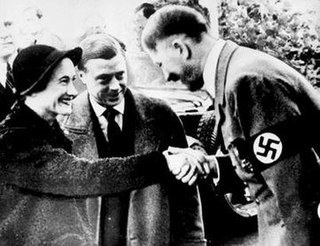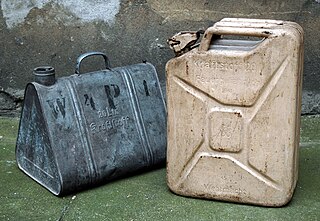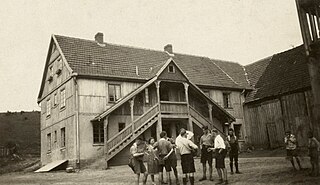 W
WThe Degenerate Art Exhibition was an art exhibition organized by Adolf Ziegler and the Nazi Party in Munich from 19 July to 30 November 1937. The exhibition presented 650 works of art, confiscated from German museums, and was staged in counterpoint to the concurrent Great German Art Exhibition. The day before the exhibition started, Hitler delivered a speech declaring "merciless war" on cultural disintegration, attacking "chatterboxes, dilettantes and art swindlers". Degenerate art was defined as works that "insult German feeling, or destroy or confuse natural form or simply reveal an absence of adequate manual and artistic skill". One million people attended the exhibition in its first six weeks. A U.S. critic commented "there are probably plenty of people—art lovers—in Boston, who will side with Hitler in this particular purge".
 W
WEdward, Duke of Windsor, and Wallis, Duchess of Windsor, visited Nazi Germany in October 1937. The Duke had abdicated the British throne in December 1936, and his brother George VI became king. Edward had been given the title Duke of Windsor and married Wallis Simpson in June 1937. He appears to have been sympathetic to Germany in this period and, that September, announced his intention to travel privately to Germany to tour factories. His interests, officially into researching the social and economic conditions of the working classes, were against the backdrop of looming war in Europe. The Duke's supporters saw him as a potential peacemaker between Britain and Germany, but the British government refused to sanction such a role and was against the tour, suspecting that the Nazis would use the Duke's presence for propaganda. Windsor was keen that his wife—who had been rejected by the British establishment—experience a state visit as his consort. He promised the government to keep a low profile, and the tour went ahead between 12 and 23 October.
 W
WThe Eternal Jew was the title of an exhibition of anti-Semitism displayed at the Library of the German Museum in Munich from 8 November 1937 to 31 January 1938. The actual displays, with photographs and caricatures, focused on antisemitic canards in presenting the Jewish attempts at bolshevising Nazi Germany. It was best exemplified in the exhibition poster presenting an 'eastern' Jew wearing a kaftan and holding gold coins in one hand and a whip in the other. The exhibition attracted 412,300 visitors, over 5,000 per day.
 W
WThe Greater Hamburg Act, in full the Law Regarding Greater Hamburg and Other Territorial Readjustments, was passed by the government of Nazi Germany on 26 January 1937, and mandated the exchange of territories between Hamburg and the Free State of Prussia. It became effective on 1 April 1937.
 W
WA jerrycan is a robust liquid container made from pressed steel. It was designed in Germany in the 1930s for military use to hold 20 litres of fuel. The development of the jerrycan was a significant improvement on earlier designs, which required tools and funnels to use, and it contained many innovative features for convenience of use and robustness. After widespread use by both Germany and the Allies during the Second World War, today similar designs are used worldwide for fuel and water containers, some of which are also produced in plastic. The designs usually emulate the original steel design and are still known as jerrycans. The original design of jerrycan and various derivatives remain in widespread military use.
 W
WMethadone, sold under the brand names Dolophine and Methadose among others, is an opioid used for opioid maintenance therapy in opioid dependence and for chronic pain management. Detoxification using methadone can be accomplished in less than a month, or it may be done gradually over as long as six months. While a single dose has a rapid effect, maximum effect can take up to five days of use. The pain-relieving effects last about six hours after a single dose. After long-term use, in people with normal liver function, effects last 8 to 36 hours. Methadone is usually taken by mouth and rarely by injection into a muscle or vein.
 W
WMit brennender Sorge On the Church and the German Reich is an encyclical of Pope Pius XI, issued during the Nazi era on 10 March 1937. Written in German, not the usual Latin, it was smuggled into Germany for fear of censorship and was read from the pulpits of all German Catholic churches on one of the Church's busiest Sundays, Palm Sunday.
 W
WThe Rhön Bruderhof was the second of the Bruderhof Communities, with around a hundred people, situated in the Rhön mountains in Germany, not far from Fulda. Begun by Emmy and Eberhard Arnold and a handful of others in 1920, its members sought a lifestyle that would offer an alternative to the bitterness and despair that ravaged Europe in the wake of World War I. They took the words of Jesus in the Sermon on the Mount as a directive on which to build their community: peacemaking, purity in relationships, love to one another and to enemies.
 W
WPolyurethane is a polymer composed of organic units joined by carbamate (urethane) links. While most polyurethanes are thermosetting polymers that do not melt when heated, thermoplastic polyurethanes are also available.
 W
W